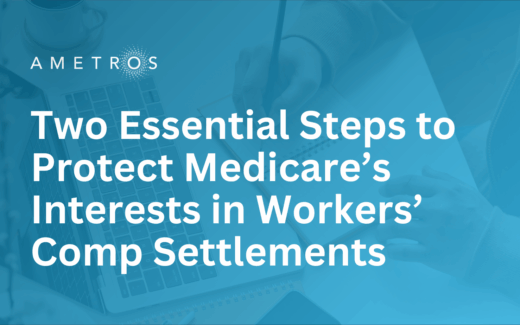Two Essential Steps to Protect Medicare’s Interests in Workers’ Comp Settlements
If you're settling a Workers’ Compensation (WC) claim that includes future medical expenses, you can't afford to overlook protecting Medicare’s interests.
The Centers for Medicare & Medicaid Services (CMS) enforces the Medicare Secondary Payer Act, which generally places Medicare as a secondary payer behind other insurance types like No-Fault, Liability, and Workers’ Compensation (WC). When future medical care is part of a WC settlement, CMS expects parties to take steps to ensure Medicare isn’t left footing the bill.
So, how do you do that? It comes down to two essential steps:
- Establishing a Workers’ Compensation Medicare Set-Aside Arrangement (WCMSA)
- Making sure it’s properly administered
Skipping either step can lead to serious consequences including Medicare denying coverage for future injury-related care.
Step 1: Setting Up a WCMSA (Workers Compensation Medicare Set Aside)
When a workers’ compensation settlement includes funds for future medical treatment, Medicare’s interests must be considered. That’s where a WCMSA comes in. See the Workers’ Compensation Medicare Set Aside (WCMSA) Reference Guide, v4.4, Sec. 3.0.
A WCMSA is a financial arrangement that allocates a portion of the settlement to cover future medical expenses related to the work injury; expenses that Medicare would otherwise pay. This helps ensure that Medicare isn’t unfairly burdened with costs.
While protecting Medicare’s interests is mandatory, submitting the WCMSA to CMS for approval is voluntary. See WCMSA Reference Guide, Sec. 8.0. Ametros collaborates closely with Medicare Set-Aside providers during the setup process and offers consultative support to help ensure the arrangement is structured appropriately. We also provide guidance to injured workers and their attorneys, helping them understand how the WCMSA will work in practice and how it can support the injured worker’s long-term care needs. For those looking to dive deeper, CMS offers detailed instructions in the WCMSA Reference Guide v. 4.4 (July 2025 release).
Step 2: Proper Administration of the WCMSA
Creating a WCMSA is just the beginning. The second step of administering it correctly is just as important.
CMS requires that WCMSAs be managed by a competent administrator. While injured workers are allowed to self-administer, CMS “highly recommends” using a professional administrator. (See WCMSA Reference Guide v. 4.4, Section 17.1.) For those who choose to self-administer, CMS provides a helpful Self-Administration Toolkit (v. 1.7, April 2025).
Whether you self-administer or hire a professional, CMS outlines key requirements:
- Keep MSA funds in a separate interest-bearing account that should be FDIC insured
- Use the funds only for Medicare-covered treatments related to the injury
- Maintain detailed records of all bills and receipts
- Report payments to CMS annually
- Submit a Final or Temporary Depletion Report when funds are exhausted
These rules apply until the funds are fully spent and final reporting is complete. Missteps like inaccurate reporting can result in Medicare denying coverage for future care, even if the error was unintentional.
Choosing Professional Administration with Ametros
With over 31,000 members, Ametros is the largest and most trusted name in WCMSA administration. We don’t just ensure compliance, but we help injured workers get the most out of their settlement.
Here’s how Ametros supports its members:
- Cost Savings: We review every medical bill and leverage our network partnerships in attempts to secure discounts on treatments, prescriptions, and more helping your funds go further.
- Enhanced Security: Your money is held in an individual, FDIC-insured account with bank-level protection.
- Simplified Reporting: We take care of all CMS reporting, payments, and record-keeping so you don’t have to.
- Freedom of Choice: Our members can visit any doctor or pharmacy without needing prior authorization or utilization reviews.
By choosing Ametros, injured workers not only ensure Medicare’s interests are protected, but they also simplify and secure their access to healthcare. This choice is in the best interest of injured workers.
Have questions? Our team of experts is here to help.



